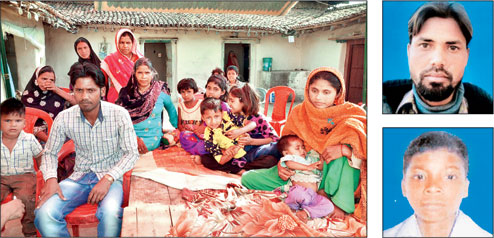
New Delhi, May 18: Latehar police have earned scathing criticism from the National Commission for Minorities for ignoring complaints of the Muslim community against the polarising activities of cow vigilantes in the district that resulted in the hanging of two cattle traders in March in an act reminiscent of Taliban-style executions.
The report - finalised today - said the police not only ignored the writing on the wall but were also "brazenly" communal in their reaction to the Muslims who protested after two cattle traders Majloom Ansari (35) and Imtiyaz Khan (13) were found hanging in the forest near Jhabar village in Balumath police station area of the district on March 18.
The commission wants the case to be handed over to the CBI because it feels people no longer trust the local police.
Sub-inspector Ratan Kumar Singh, who happens to be the OC of Chandwa thana, some 20km from Balumath, has been named in the minorities commission report for physically attacking protesters after the bodies were discovered.
He is said to have "used extremely provocative, abusive and communally charged language against Muslims at this protest" including pulling the beard of the brother of one of the deceased and calling him a Pakistani agent.
Minorities commission member Farida Abdulla Khan, fresh from a visit to Jharkhand to investigate the Latehar killings, told The Telegraph that political patronage to Gau Raksha committees and frequent "go-to-Pakistan" chants not only polarised society but also hemmed in the police and the administration from doing their jobs fairly.
"If this is the dominant culture, then the police and administration tend to fall in line," she said, seeing a common thread running through the Muzzafarnagar riots of 2013, the Dadri lynching over suspected consumption of beef last year and Latehar hangings this March.
According to the report, the violence that erupted at the protest on Balumath Road on March 18 was a result of people's disappointment and anger against the administration for ignoring the complaints about those who had indulged in violence against the minority community.
"The local Muslim population was stunned by the gruesome hanging of two innocent citizens, one a mere 13-year-old, struggling to help his poverty-stricken family make ends meet," the report noted.
As for the Gau Rakshak Samitis in the district, residents reported to the two-member commission's team of Farida Abdulla Khan and Praveen Davar that the movement started as recently as in 2012 after one Baba Gopal Maniji Maharaj from Dehradun started visiting their area.
"At the meetings of these committees, there is incitement to hatred and an attempt to target Muslims in the name of cow protection," the report noted.
The commission asked the state government to ensure the Latehar victims' families were adequately compensated in keeping with the gravity of the crime and the fact that both victims were primary breadwinners.
Chief minister Raghubar Das had invited the families of the two Latehar victims to Ranchi earlier but they refused to go, pointing out that he had apparently visited the house of the main accused last year for a meal.
The state government has a provision for Rs 3.5 lakh as compensation but the panel has urged the administration to consider topping it in view of the circumstances of the case. Also, the administration should take visible steps, including monitoring the activities of Gau Rakshak Samitis to reassure the Muslim community that their lawful activities, including cattle trading, will be protected from so-called vigilantism, the report urged.
Though it does not say so in as many words, the report echoes the sentiment aired in the Rajya Sabha earlier this month during the discussion on growing incidence of attacks on cattle traders, that the incidents are not a law and order issue, but part of the effort to polarise society and regiment it.
Twisted lyrics
The minorities commission also visited Hazaribagh which saw violence on April 17 during the Ram Navami procession. "We were told that the (procession) committees are advised every year to avoid playing songs directed against any community. These check-lists are given to them every year and although they agree to abide by these, they circumvent it by using one excuse or the other," the report said. Though songs with twisted lyrics have been in vogue for many years in defiance of administrative orders, the commission was told that the tenor of the songs played this time was much sharper in their anti-minority bias.










